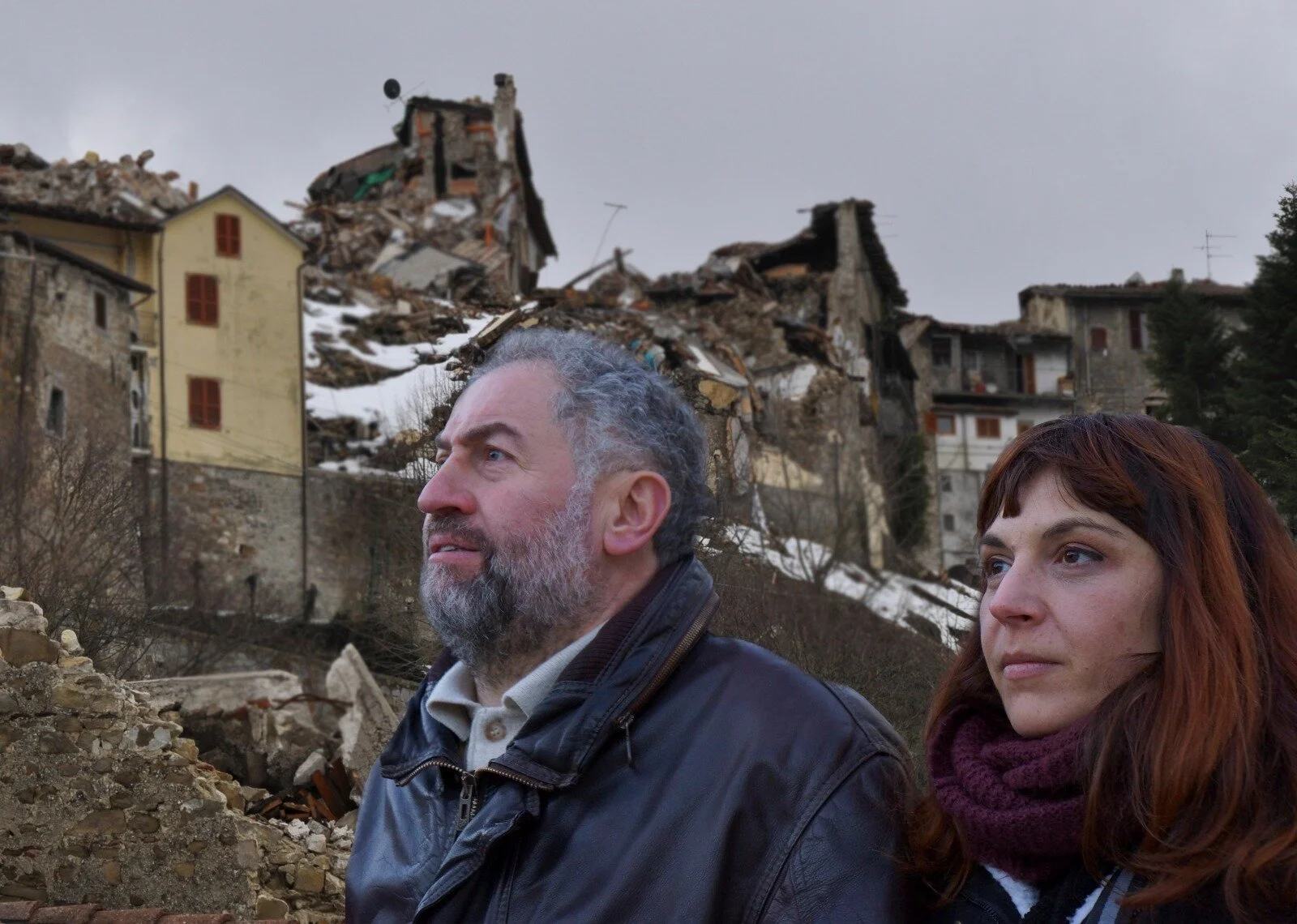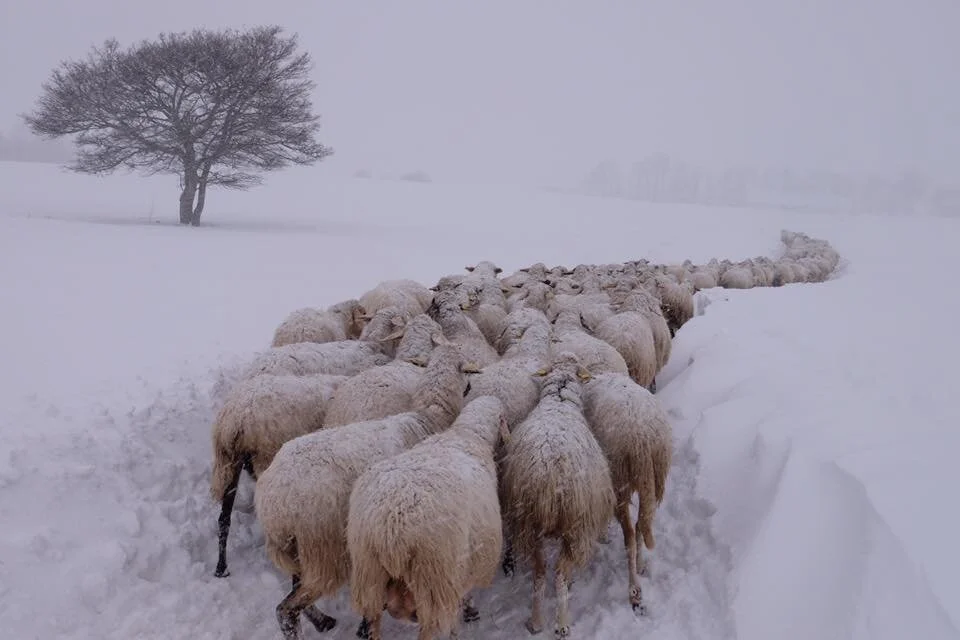How Covid is pushing
some Italians towards mountain life
Young people have been abandoning
Italy’s mountain villages for decades
– but could this be about to change?
By Federico Formica
Photo / Elena Pascolini
Elena Pascolini remembers the exact day she decided to not return to Ancona, the seaside town where she had lived her entire life. It was September 8, 2016, and she had just finished a ten-day shift as a Civil Protection volunteer in Arquata del Tronto, a central Italian town of one thousand inhabitants. It had been hit by a huge earthquake that August, which killed 299 people in the region. "Back in the city, I felt useless,” the 46-year-old explains. “My life no longer fit the person I had become. And the thought of going back to my comfortable home knowing that those people no longer had one made me sick. I had to stay."
And so she stayed. Today, Elena lives in the heart of the Apennines, the mountain range that covers most of Italy’s inland area. She is surrounded by the bleakness of the ruins as well as the beauty of the mountains, meadows and forests. Alongside her boyfriend Stefano Cappelli, she runs the only accessible hiking lodge on Mount Vettore, the highest peak of Sibillini National Park. Stefano previously worked as Arquata’s local baker and was a rescue coordinator following the disaster. He says he knew every single person he saved from the rubble.
Photo / Marco Scolastici
Elena is one of a small but growing number of people going against Italy’s major population movements trends and choosing to leave the coastal and city regions in order to move inland. These mountainous areas cover 60% of the Italian peninsula and are home to over 4,000 municipalities and around 13 million people. Since the second world war, younger people have tended to leave these territories and move to big cities, particularly in northern Italy. The elderly are thus left behind: internal areas are ageing at twice the speed of the rest of the country. Fewer residents means less investment and poorer services: more than 80% of inland municipalities do not have public high schools.
However, when Italy became the first European country to lockdown against the Covid-19 epidemic in March, these sparsely populated villages immersed in hills and mountains proved to be more resilient than cities. The weaknesses of these areas – low population density, lack of large hospital centres and few care facilities – turned out to be strengths when it came to stopping contagion.
“Back in the city, I felt useless. My life no longer fit the person I had become.”
And now that the emergency is over, another aspect of the lockdown is working in these areas’ favour. During the pandemic almost 8 million Italians worked from home and, according to one survey, 60% would like to continue doing so. The minister of public administration, Fabiana Dadone, has also said she would like to keep 40% of public employees working remotely. In the Italian Apennines it's difficult to find work, but if remote working does become the norm rather than a temporary, emergency measure, other people could make the same choice as Elena while still keeping their city jobs. This could revive local economies and attract new services.
Chiara Caporicci, 37, fulfilled her dream of moving to the Apennines four years ago thanks to remote working. Originally from Pioraco, a town in the Marche, she had lived in Bologna for seven years and was working as project manager in a design studio when she decided to go help with the earthquake recovery. After several months of travelling back and forth she chose to permanently relocate. While working remotely, she also co-founded CASA alongside six other young people. This stands for “cosa accade se abitiamo” (what happens if we reside), and the organisation aims to fight the depopulation that had been happening for years and was worsened by the earthquake.
Photo / Chiara Caporicci
CASA hosts writers, poets, musicians, historians, architects and sociologists from all over Italy, who come to talk with local residents and associations. It’s located in Frontignano di Ussita, which used to be a popular tourist resort until the ski facilities were damaged by the earthquake and forced to close.
"When we talk about revitalising the internal areas, solutions are dropped from above, often in good faith, but which do not take into account the particular context in which we find ourselves,” Chiara explains. "This is why we ask the artists and professionals who come to stay with us to be ready to change their minds and to question themselves. The Apennines are a difficult territory with needs that are often different to those a city dweller can imagine." Chiara hits on an important point: after 70 years of population movements, cities and towns have developed different values and mentalities. Those who want to live in inland Italy must open themselves up to listening and changing.
“Living here doesn’t just mean having a farmhouse surrounded by greenery. These are difficult places and whoever is moving here should know that.”
CASA’s aim is to produce a "pact of collaboration" with neighboring municipalities. "We would like to take care of some natural trails and fountains," explains Chiara. Another project provides services to older residents such as the delivery of medicines, magazines and newspapers, in an area where the first general practitioner is seven kilometres away.
Both Chiara and Elena believe that life post-Covid could give city dwellers extra motivation to move to the mountains. However, neither is expecting – or hoping for – a complete exodus. "Living here doesn't just mean having a farmhouse surrounded by greenery and fresh eggs every morning. These are difficult places and whoever is thinking of moving here should know that in advance," says Elena. "For example, if you have children over the age of ten, you need to be prepared to travel 50 kilometres a day to take them to school." In general, most inland inhabitants perceive themselves as guardians – of a lifestyle and culture made up of routes, food, traditions and relationships. "Living here means embracing the mountains and doing jobs related to nature, tourism, agriculture and food," says Elena.
This is the decision 32-year-old Marco Scolastici made in spring 2016 when he left Rome, where he had studied economics at university, to go rear an ancient breed of local sheep in the land of his grandfather, Macereto. He is now a mountain entrepreneur, producing high quality milk, cheese and wool 70 kilometers north of Arquata del Tronto, where Elena lives. The earthquake almost ruined his plans by making his farm uninhabitable, so Marco bought a yurt (a circular tent) and spent the harsh mountain winter there. "I was faced with a choice,” he says. “To go live in a temporary house and leave my animals, or stay here. I had no doubts."
Photo / Marco Scolastici
Today his farm is up and running again and he hosts artists and writers in the yurt, even recording a music album there: “I've found that it has wonderful acoustics for live music.” During the pandemic Marco fell ill with coronavirus while staying with his parents in Tarquinia, a hundred kilometres north of Rome, and was hospitalised for ten days. "If I had stayed in my mountains I certainly wouldn't have got sick," he jokes.
Marco now sees potential for the region. "Maybe it's too early to say, but I think new scenarios are opening up,” he says. “Many people have already returned to visit us, and I have noticed a renewed interest in the mountains and nature."
Photo / Marco Scolastici
Marco spends his days outdoors among his animals and in the dairy farm. Elena, meanwhile, gets up at 4am to prepare breakfast for hikers before their morning walks, then visits locals farmers and breeders to restock her pantry. Later, she divides her time between cleaning the hut and giving excursion tips to her guests. In Ussita, Chiara works remotely from the association headquarters, and later on tends to her vegetable garden or meets other villagers for a chat or a walk. They lead simple yet often tiring lives.
For all three, the Apennines are the crowning achievement of their life journeys. It’s possible they may be seen one day as the pioneers of a return to the inland areas of Italy. Later on, when Elena has finished her day's work at the lodge and her three hiking guests are sleeping, she comes out of the wooden door and observes the thousands of stars above the Sibillini mountains. "I feel useful here,” she says in a low voice. “In the city I didn't miss anything, but I felt empty. My life is here."





